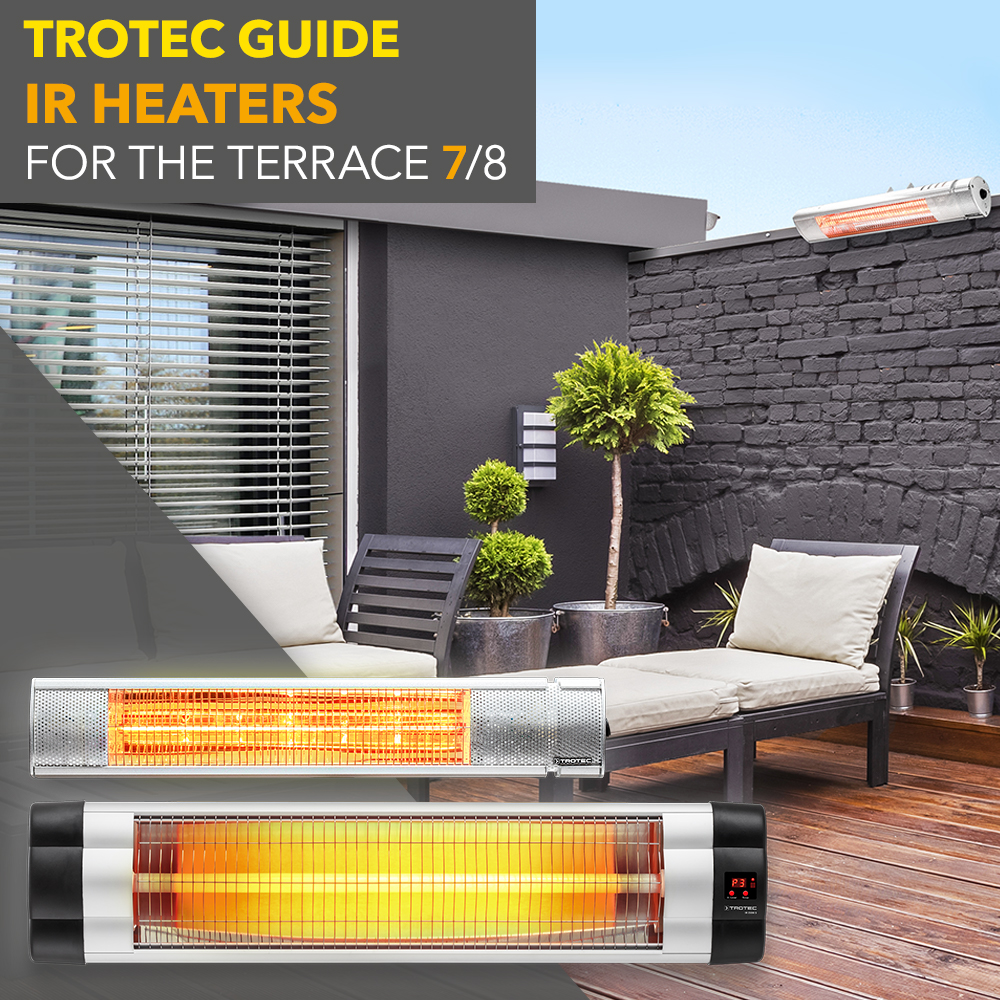In the second to last issue of the ‘Infrared radiant heaters for patios’ Trotec guide, the subject of safety is addressed once again. Today, we will be discussing whether you would like to use your patio IR heater under a roof or without a roof. Because if the device is exposed to all kinds of adverse weather conditions, from rain showers and wind to snow and frost, your heater should have an IP protection class that can easily withstand all these weather conditions – and still provide you with reliable heat when needed.
IP protection class – What does that mean again? IP stands for International Protection and uses a code number system to define the extent to which the unwanted penetration of foreign bodies and moisture into the interior of the device is prevented. In conjunction with the letters ‘IP’, this means protection against contact, foreign bodies and water. The combinations of the subsequent code numbers are precisely defined in the national and international DIN standards – they designate the protection type in the various IP classes.
One example – what does protection class IP65 stand for?
The first code number 6 stands for the degree of protection of the housing against contact and also provides information on protection against foreign bodies. The second code number 5 indicates the degree of protection of the housing against moisture and water ingress. An IR heater with protection class IP65 therefore has complete protection against accidental contact once you have examined the DIN table. Dust cannot penetrate and the device is protected against jets of water from any direction.
If the IR heaters are installed under the roof, canopy or balcony, then the IP24 protection class suffices completely, provided the roof reliably repels the water sprayed by the rain. If, on the other hand, the IR heaters are directly exposed to the weather, the housings have to be IP 55 or IP 65 protected. These IR heaters are absolutely dustproof and protected against jets of water on all sides – for example, the Trotec range includes all infrared heaters of the IRD series (IP55) as well as the IR 2010 and IR2050 (IP65) radiant heaters.
Please take care during installation
Have you already thought about the permissible total load of the electrical circuit for your patio? And have you subsequently opted for a model that seems best suited to the place of installation according to the IP protection class? All you then have to do is install the device. Here are a few helpful tips:
- Follow the instructions step by step during installation.
- Observe all safety instructions.
- Maintain the safety distance in case the IR heater is attached to a combustible material such as wood.
- Do not place the radiant heater too close to flammable objects such as curtains or shelves. We recommend a distance of at least 50 cm here.
This is how you can learn more about the infrared heater solutions from Trotec:
- You will receive comprehensive information on our infrared heater series in our Trotec shop – where you can find the IR-S radiant heaters, IR radiant heaters, IRD dark radiant heaters as well as the IRS-E pedestal radiant heaters.
- Continue to follow our guide series on this subject: In the last issue, we feature all Trotec infrared heaters in a direct comparison.
- Call our Trotec team of experts at +49 2452 962-400 or use our contact form. We provide advice when it comes to choosing one and answer your questions about our infrared heater series.
Overview of the ‘Infrared radiant heaters for your patio’ Trotec guide
1/8 Taking a look – How IR heaters actually work
2/8 Basic rules – This is how IR heaters are basically setup
3/8 Advantageous – IT heaters bring efficient cosy warmth
4/8 Numerous variants – The right IR heater for every purpose
5/8 Calculable – What IR heaters cost in terms of electricity
6/8 Numerous voltages – This is how IR heaters are supplied with electricity
7/8 To be on the safe side – The IP protection class is decisive for IR heaters
8/8 In a nutshell – What matters when it comes to IR heaters


